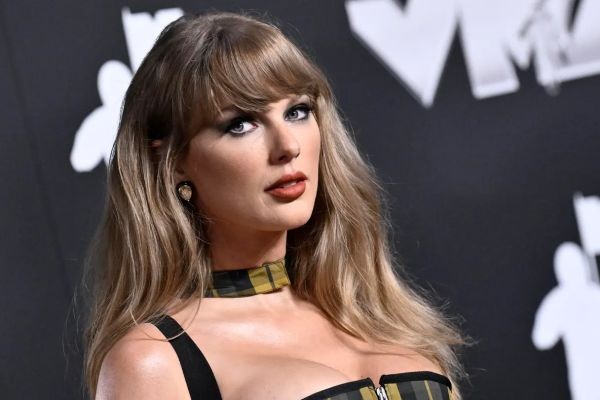You'd have to be pretty foolish to dismiss the hold that musicians from Beyoncé to Ariana Grande to Chappell Roan have on pop culture at large. (I mean, Queen Bey is basically her own transit system on concert nights!) But arguably the shiniest star in the celebrity-influence constellation is one Ms. Taylor Alison Swift, who made headlines last week for endorsing Kamala Harris.
The celebrities-for-Kamala endorsements have been coming fast and furious ever since Harris officially initiated her campaign in July, but Swift is (so far) the musician whose fandom appears to have translated most directly to political action. “Since forming on July 21, Swifties For Kamala has raised over $213k for the Harris campaign and directed over $13,000 from our merch collaboration with Social Goods to voter registration efforts,” says Irene Kim, co-founder and executive director of the Swifties For Kamala movement. In many ways this shouldn't come as a surprise; just look at the fiscal effect of her tours—seen by some as boosting entire economic regions.
Indeed, ever since Swift urged fans to register to vote in her endorsement, voter registration has spiked in certain states, including, according to The Boston Globe, in Massachussetts and, more crucially from an election standpoint, Pennsylvania, where the amount of new voters registered almost doubled in the week following the debate and Swift's endorsement of Harris. (It's also been estimated that Swift's Instagram link to Vote.org sent more than 400,000 people to the site.)
The intersection of politics and celebrity culture is not a new phenomenon. From Frank Sinatra's endorsement of John F. Kennedy in 196 to Oprah Winfrey's influential support for Barack Obama in 2008, celebrities have long used their platforms to advocate for political candidates. However, the question remains: do celebrity endorsements actually affect election outcomes?
The Power of Celebrity Endorsements
Celebrities, with their vast followings and influential platforms, have the potential to sway public opinion. According to a study by the University of Maryland, a celebrity endorsement can increase a candidate's vote share by up to 3% (1). This influence is particularly potent among younger voters, who are more likely to be influenced by popular culture.
However, the impact of celebrity endorsements is not always positive. A study published in the Journal of Political Marketing found that while celebrity endorsements can increase a candidate's visibility, they can also alienate voters who do not align with the celebrity's values or image (2).
The Oprah Effect
Perhaps the most famous example of a celebrity endorsement impacting an election is Oprah Winfrey's endorsement of Barack Obama in the 2008 presidential race. According to a study by Craig Garthwaite and Timothy Moore, Winfrey's endorsement was responsible for approximately 1,000,000 votes for Obama in the Democratic primary (3). This suggests that celebrity endorsements can indeed have a significant impact on election outcomes.
The Counter Argument
Despite these findings, some argue that the impact of celebrity endorsements on elections is overstated. A study by the Pew Research Center found that 78% of Americans said that a celebrity endorsement would not affect their vote (4). This suggests that while celebrities may be able to generate buzz for a candidate, they may not necessarily be able to sway voters.
Furthermore, a study published in the Quarterly Journal of Political Science found that celebrity endorsements had no significant effect on the 2008 presidential election, contradicting the findings of the Garthwaite and Moore study (5). This highlights the complexity of the issue and the need for further research.
Conclusion
In conclusion, the impact of celebrity endorsements on elections is a complex and contested issue. While some studies suggest that celebrity endorsements can sway voters and even impact election outcomes, others argue that their influence is limited. Ultimately, the impact of a celebrity endorsement likely depends on a variety of factors, including the celebrity's popularity, the alignment of their values with the candidate's, and the demographics of the electorate.
Sources:
- https://www.rhsmith.umd.edu/files/Documents/Centers/CEME/ConferencePapersandSlides/2013/Huber.pdf
- https://www.tandfonline.com/doi/abs/10.108/15377857.2012.693568
- https://www.nber.org/papers/w13956
- https://www.pewresearch.org/fact-tank/2016/11/07/celebrity-political-endorsements-dont-matter-much-to-voters/
- https://www.cambridge.org/core/journals/quarterly-journal-of-political-science/article/abs/does-celebrity-endorsement-matter-evidence-from-the-2008-democratic-presidential-nomination/3AD2B7C8F8828A37FCC0904B9FA2B6E









